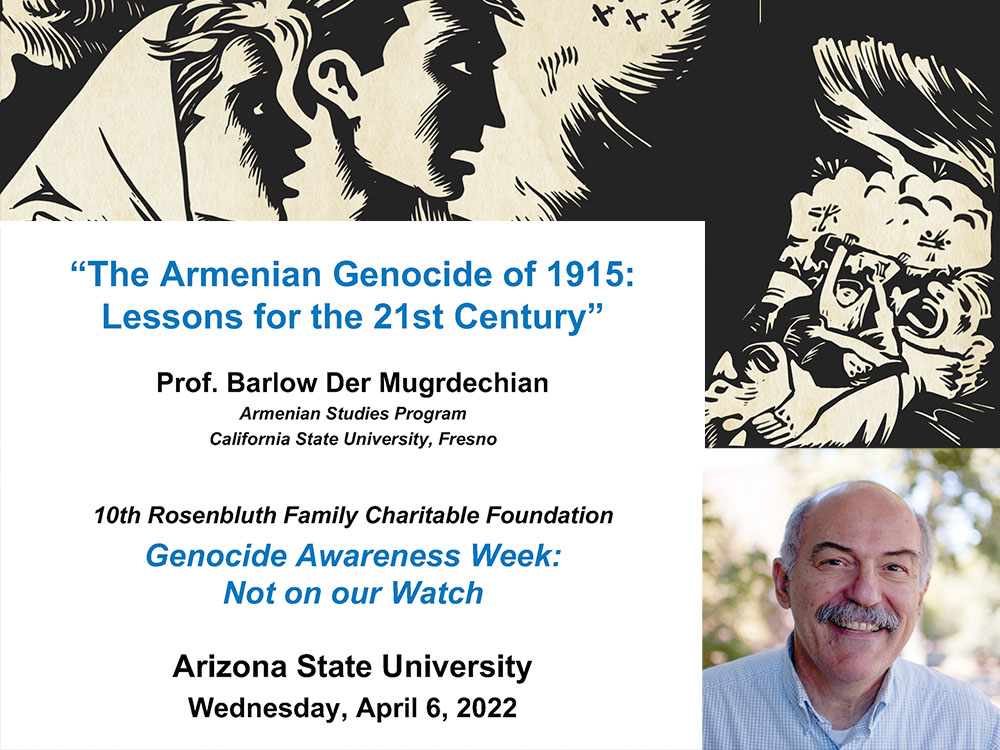 Michael Mazman
Michael Mazman
Staff Writer
On Wednesday, April 6, 2022, Prof. Barlow Der Mugrdechian gave a presentation titled, “The Armenian Genocide: Lessons for the 21st Century” during the 10th Annual Genocide Awareness Week that took place at Arizona State University, April 4-8, 2022. His discussion, which emphasized the lessons learned from studying the Armenian Genocide, was delivered in-person and also livestreamed virtually.
Prof. Der Mugrdechian began with an introduction of the Armenian Genocide and described the different policies used against the Armenians by the Ottoman Turkish government, such as the state confiscation of Armenian goods and property. “It wasn’t just a matter of killing people,” stated Prof. Der Mugrdechian. “The financial incentive of taking over Armenian homes, land, businesses, and bank accounts was an important dimension in the Armenian Genocide.”
Another noteworthy policy implementation was the Ottoman Turkish government’s “Temporary Law on Deportation,” which authorized Ottoman officials to forcibly oust the Armenian population (including women, children, and the elderly) from their homes under the pretext of protecting them. Although the Armenian deportees were promised to be returned to their homes later, most were marched for hundreds of miles to their death in the deserts of Northern Syria and Iraq. This was the primary method used to eliminate the bulk of the Armenian population in the Ottoman Empire.
Prof. Der Mugrdechian emphasized analyzing all facets of history as an important lesson to be learned from studying the Armenian Genocide. “To understand the mechanisms of genocide, we have to get as much information that we can about not only the history, but also things like economics and social conditions,” said Prof. Der Mugrdechian. “From there, conclusions can be drawn about the causes of the genocide and how they can be prevented from happening again in the future.”
Despite the documentation of these brutal policies being used against the Armenians in the Ottoman Empire, the Turkish government has continued to deny that an Armenian Genocide ever occurred. In fact, Prof. Der Mugrdechian cites denial as the final stage of genocide, which is among the surest indicators of further genocidal massacres. “The best response to denial is punishment by an international tribunal or national courts, but that never happened in the case of the Armenian Genocide,” stated Prof. Der Mugrdechian. “The evidence which should have been made part of the world record was never brought to light.”
Because of this, the Turkish government has never been punished or held responsible for its crimes against humanity, making it easier for future genocides to occur. Prof. Der Mugrdechian referred to this “unpunishment” as a lesson not learned from the Armenian Genocide. Being the first modern genocide of the 20th century, the Armenian Genocide served as a model for a series of genocidal acts around the world, including the Jewish Holocaust, the Cambodian Genocide, and the Rwandan Genocide.
Moreover, the fact that no state has been held responsible for the Armenian Genocide becomes extremely pertinent when considering the recent events in Artsakh. During the September-November 2020 war, the Armenians in Artsakh were subjected to ethnic cleansing and threats of genocide by Azerbaijan, a close ally to the Republic of Turkey.
Genocide Watch, a non-governmental organization led by world-renowned genocide expert Gregory Stanton, released a Genocide Emergency Alert in November 2020, stating that Turkey’s role in aiding Azerbaijan during the war sparked fears that Turkey would resume the Armenian Genocide of 1915. These issues reaffirm the relevance of the Armenian Genocide to modern-day crimes against humanity.
Prof. Der Mugrdechian argues that in order to move forward, there needs to be education about past genocides as a means of genocide prevention. Additionally, systems should be developed to detect the early warning signs that a genocide may occur.
Prof. Der Mugrdechian cites the growing number of university programs in the United States that offer classes in Holocaust and Genocide Studies as a step in the right direction. Publications in journals and professional organizations that study genocides have also grown in number around the world.
To conclude his presentation, Prof. Der Mugrdechian discussed the construction of the Armenian Genocide Monument at Fresno State in 2015. “The genocide memorial’s intent was to not only commemorate the victims, but also to educate and inspire future generations to work towards the prevention of genocide,” said Der Mugrdechian.
Surely, there is nothing inevitable about genocide. However, genocide prevention requires more than just awareness – it requires action. Without a global effort towards the education and detection of genocide, the world may be subject to more crimes against humanity, like the Armenian Genocide, in the future.
 Hye Sharzhoom Armenian Action
Hye Sharzhoom Armenian Action